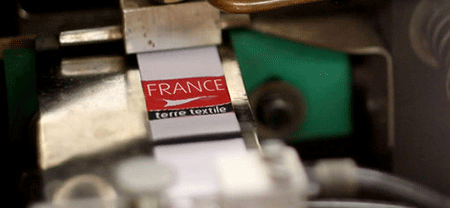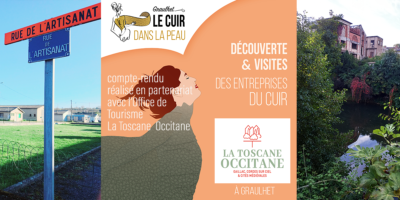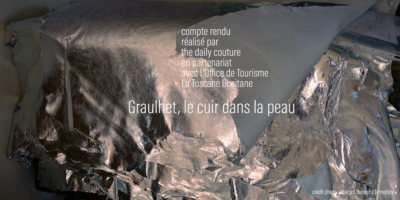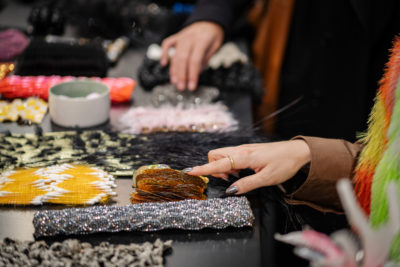The ‘Made in’ label does spread confusion for real. Did you know, for example, that a garment labelled made in Tunisia, Morocco or Romania etc. may have been made from textiles made in France? The ‘Made in’ label only inform us of the last step in the manufacture of a product, and this, it should be noted, in a sector with a hyper globalized supply chain. The label can’t be reliable to know about where a product was made. More precisely, there is no obligation to mark textile origin in the European Union due to a disagreement between the Member States. It is therefore prohibited to impose the indication of origin in order not to affect the free movement of goods within the EU. Enough to deprive the famous label ‘Made in France’ , proudly proclaimed here and there, of its meaning and credibility.
Sixteen million products are labelled France Terre Textile because the current ‘Made in’ was « not adapted to the reality of the industrial field ».
In light of that context, the Union des Industries Textiles launched the France Terre Textile label at national level, at the Maison du Textile in Clichy on October 13th. The France Terre Textile label was born with its four regional presidents, Gianni Pavan for Alsace, Paul de Montclos for the Vosges, Raphaël Clochette for the North and Eric Boel for Auvergne Rhône-Alpes. « We make hundreds of millions of meters of fabric, we dress hundreds of millions of people, no one knows. There is no way today to enhance the value of French industry, » commented Paul de Montclos.
The time had come to restore the image of this industry at the national level and to convey this message: it is a « sector of the future », a « sector in resilience ».
Initiated on a voluntary basis by textile manufacturers ranging from very small to large companies, the France Terre Textile label guarantees that more than ¾ production operations are carried out in France according to social, environmental and qualifying commitments, insists the collective. Very demanding, the quality of the products « makes prices higher than in low-cost countries ». In this context, companies are obliged to work on the label because the current « Made in » was « not adapted to the reality of the industrial field ».
As of today, products or fabrics are labelled, and not companies. “We can check ourselves whether or not the label is present on the products: it will have the logo and a licence number. The audit is carried out according to the criteria of the Charter of Commitment by an independent agency. The objectives are to perpetuate jobs, produce locally, respect environmental and social commitments, etc. And the controls are carried out every year.
To date, more than 16 million products have been labelled, reflecting the textile know-how of more than 70 companies covering four territories: Vosges, Alsace, Nord and Auvergne Rhône-Alpes. Other regions should join them.
Enhancing origin and know-how: a priority for French textile manufacturers
Internationally, the label is an excellent tool for communicating and promoting the know-how of French textile companies, says Paul de Montclos, who, for the first time this year, during a tour in Asia, was asked questions about the label by people he did not know.
In the companies themselves, internally, the impact of the label is very positive: the renewed pride of employees in the textile industry. In the wake of the new way of promoting the textile industry, the success of the open doors by the companies came as surprise and sign of this new dynamism of the sector :
« Our employees were all very proud to know that they belonged to a sector that was restoring its image, we have employees who are very committed to this project, « Paul de Montclos
Anything that helps the well-being of employees at work is not a small success. Rather, this is even an achievement considering the « image deficit » of the textile industry in France, still conveyed by the media as well.
« At the slightest report on an industrial or labor problem, the first image we see is a clothing workshop. Quite often, we want to say: « but we are not on the same planet! Come and visit my company, there are more computers than employees! « These are extremely sophisticated companies », corrects Paul de Montclos.
The textile industry: « It is not a disaster industry, it is an industry of the future »
It is time to have a new outlook on this industry: it represents 60,000 jobs in France and a turnover of 13 billion euros (source: IUT). Beyond fashion and home furnishings, the textile industry includes technical fabrics found in the aerospace, aeronautics, health, agriculture, construction, etc. This sector « which has bet on innovation », with its technical and intelligent textiles, is one of the 34 plans to reconquer the industry in France, and presented by the government in 2013. « These textiles irrigate all the nation’s industrial sectors; connected textiles will need technology, and France is one of the world’s best placed countries to fight on these issues », Paul de Montclos.
And to conclude:
« We must anticipate the future and we need talents if we want to strengthen the skills of the textiles of the future, with an age pyramid that means that some will no longer be there in a few years. We need to attract young people and talents. The label is also about having a little weight with regard to institutions and fostering dialogue with the public authorities to optimize the potential of the textile industry in France, » said Eric Boel, also CEO of Les tissages de Charlieu
In addition, since the tragedy of the Rana Plaza in Bangladesh killing over 1000 fashion workers due to poor working conditions, the France Terre Textile label « is not the only answer », but « it is », concluded Paul de Montclos.
« Let’s stop talking about price, let’s talk about provenance. We come up with another story », Paul de Montclos.
In a context where « consumers are very fond of traceability and readability », the collective action is part of a « timely moment » where France Terre Textile now intends to extend its impact to the national level.
And to do so, France Terre Textile’s next meeting with the public will take place from 18 to 20 November, at the Porte de Versailles in Paris, during the Fair of Made in France products… The exhibition whose title should not therefore be taken for granted.





